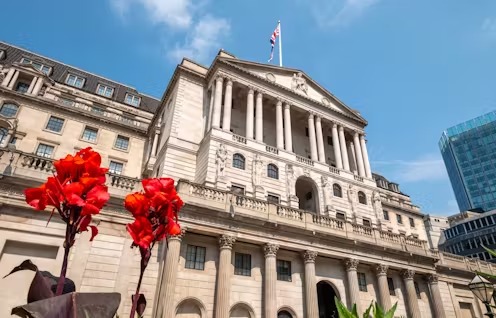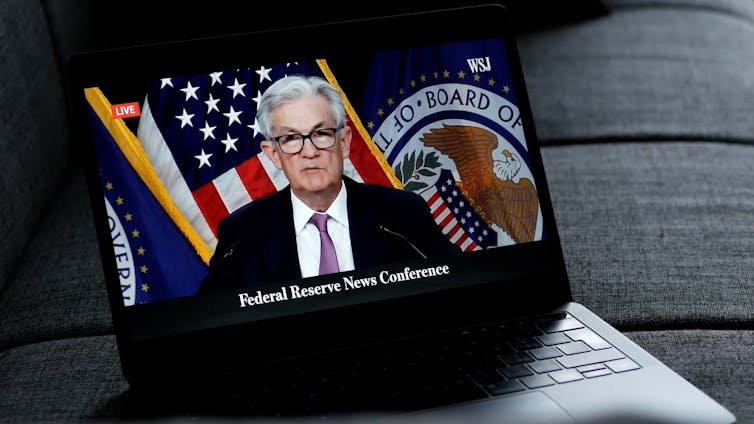In 2023, central banks, which manage the monetary policy of a country, faced unprecedented financial losses – the US Federal Reserve alone reported a record US$114.3 billion (£86 billion) operating loss.
Losses like this have become increasingly common, with 40% of central banks in developed countries recording deficits in 2023 (see the graph below). This made 2022 and 2023 the worst years in recent history.
These shortfalls raise concerns about the role and independence of central banks, as was shown by the political pressure faced by the Swiss National Bank in a 2014 petition to limit its autonomy. Understanding why central banks incur losses, and how these differ from those of private institutions, is crucial for understanding the current environment. It’s also crucial that politicians understand why losses might be preferable.
Unlike private companies, central banks do not operate for profit. Their mandate is to control inflation and support the country’s financial and economic stability. While businesses are measured by the profits they generate for shareholders, central banks are evaluated by their success in maintaining price stability.
The recent losses were the result of interest rate hikes introduced to combat the surge in inflation in 2022. Raising interest rates to make borrowing more expensive is one of the main levers central banks use to control inflation.
Percentage of central banks with losses
However, during the 2008 financial crisis and the COVID pandemic, central banks had bought assets such as government bonds to inject money into their economies and stimulate spending, a process known as quantitative easing (QE). But as interest rates began to rise, the value of these assets — acquired when rates were lower — declined.
Central banks had turned to QE to encourage spending because they could no longer lower interest rates, which had hit zero. But when the bonds fell in value and central bank interest expenses began increasing, central banks started incurring losses.
For future crises, central banks will have to evaluate the effectiveness of QE. But their losses should be viewed as part of the cost of managing economic crises and not as a sign of failure.
A central bank’s effectiveness hinges on its independence. History shows that political interference can be disastrous, as politicians resist central bank losses. They do this because central bank profits often support government budgets, reducing the need for unpopular tax hikes.
For example, in Argentina and Turkey, political pressure on central banks to finance budget deficits has resulted in poor policy decisions, leading to repeated bouts of runaway inflation and prolonged economic instability.
Politicians also tend to favour low interest rates to stimulate the economy and get consumers spending. However, low rates can encourage excessive debt in both the private sector and government. For example, keeping interest rates low despite rising inflation has led to skyrocketing house prices in Turkey, and exacerbated its cost of living crisis.
When circumstances change — say, the need to raise rates to combat inflation — excessive debt can increase vulnerability to shocks, such as the COVID pandemic and the war in Ukraine.
To achieve stability, central banks must be free to incur accounting losses when necessary, and they need politicians to accept that losses can be a reasonable way of dealing with economic circumstances.
Why banks report losses
Our research, provides systematic evidence that central banks are uncomfortable reporting losses. Analysing financial statements from central banks in 155 countries over 23 years, we found they are significantly more likely to report slightly positive profits than slightly negative losses.
This tendency to avoid losses mirrors the behaviour of commercial banks and corporations that “manage” their reported earnings to meet or beat targets.
Importantly, our findings suggest that central banks under pressure — particularly those facing extreme (right- or left-wing) leaders — are 19 times more likely to report small profits than small losses. This likelihood drops to four times under centrist leaders.
Additionally, central banks with governors that can be reappointed at the end of their term are more than seven times more likely to report small profits, compared to those with non-reappointable governors, who are only twice as likely.
And as we show, central banks that “bunch” just above the zero-profit threshold tend to maintain lower interest rates than would be expected by the inflation rate. They achieve systematically higher inflation rates.
While this does not prove that political interference is distorting central bank policies, it indicates that their incentives to avoid losses correlate with their policy choices and inflation outcomes, as well as government leanings and the governor’s chances of a renewed term. Another interpretation is that incentives to avoid reporting losses are stronger when inflation rates are above target.
Importantly though, both interpretations indicate that central banks may not be as independent as you might think.
Why does this matter now? For one, the actual losses central banks face may be even larger than in the graph above. Our research shows that central banks often use accounting techniques to manage their reported profits, effectively hiding the true extent of losses.
Chair of the US Federal Reserve Jerome Powell has warned against political pressure on central banks. Domenico Fornas/Shutterstock
Hidden losses indicate that central banks are under external pressure — often political — to minimise accounting deficits.
This pressure can lead to bad policies, such as prematurely lowering interest rates to reduce central bank losses and supporting government budgets by lowering debt servicing costs.
However, this could backfire by causing inflation to surge. So understanding, and accepting there could be losses, as well as addressing hidden pressures on central banks is crucial for ensuring they can make the tough decisions necessary for long-term economic stability.
Politicians and the media share responsibility for the climate in which central banks operate, and their responses to losses often determine how central banks will act in future.
Importantly, central banks must remain financially independent so they have the resources to respond to crises and can act immediately without having to go cap in hand to their government.



 RBA Expected to Raise Interest Rates by 25 Basis Points in February, ANZ Forecast Says
RBA Expected to Raise Interest Rates by 25 Basis Points in February, ANZ Forecast Says  Lee Seung-heon Signals Caution on Rate Hikes, Supports Higher Property Taxes to Cool Korea’s Housing Market
Lee Seung-heon Signals Caution on Rate Hikes, Supports Higher Property Taxes to Cool Korea’s Housing Market  Russian Stocks End Mixed as MOEX Index Closes Flat Amid Commodity Strength
Russian Stocks End Mixed as MOEX Index Closes Flat Amid Commodity Strength  Yen Slides as Japan Election Boosts Fiscal Stimulus Expectations
Yen Slides as Japan Election Boosts Fiscal Stimulus Expectations  Dollar Near Two-Week High as Stock Rout, AI Concerns and Global Events Drive Market Volatility
Dollar Near Two-Week High as Stock Rout, AI Concerns and Global Events Drive Market Volatility  Fed Confirms Rate Meeting Schedule Despite Severe Winter Storm in Washington D.C.
Fed Confirms Rate Meeting Schedule Despite Severe Winter Storm in Washington D.C.  ECB’s Cipollone Backs Digital Euro as Europe Pushes for Payment System Independence
ECB’s Cipollone Backs Digital Euro as Europe Pushes for Payment System Independence  RBI Holds Repo Rate at 5.25% as India’s Growth Outlook Strengthens After U.S. Trade Deal
RBI Holds Repo Rate at 5.25% as India’s Growth Outlook Strengthens After U.S. Trade Deal  Indian Refiners Scale Back Russian Oil Imports as U.S.-India Trade Deal Advances
Indian Refiners Scale Back Russian Oil Imports as U.S.-India Trade Deal Advances 



































